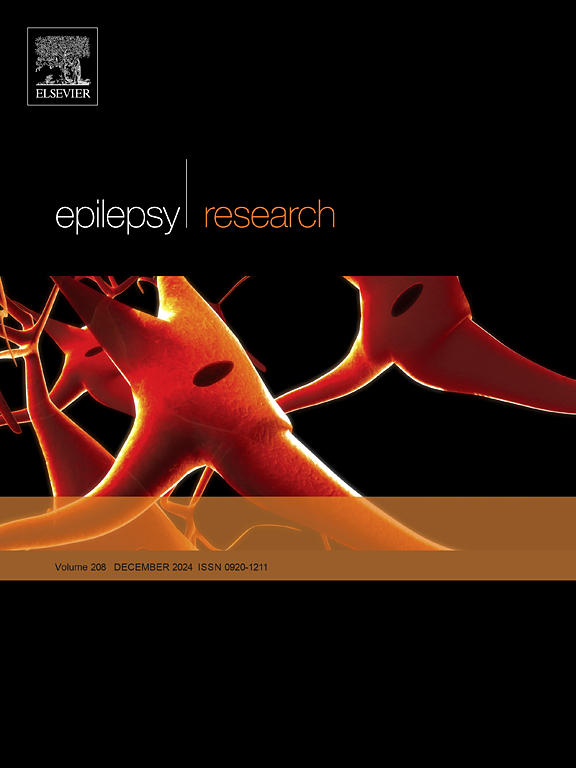Perceptions of health disparities among neurologists treating Black patients with epilepsy: A survey study in the United States
IF 2
4区 医学
Q3 CLINICAL NEUROLOGY
引用次数: 0
Abstract
Objective
Many factors influence patients’ experience with epilepsy, including inequities based on socially defined race and ethnicity. We sought to better understand factors contributing to health disparities in Black people living with epilepsy (PWE), as perceived by neurologists, and the value of programs to help healthcare providers (HCPs) reduce these disparities.
Methods
An online, blinded, cross-sectional survey was administered to neurologists (November 8–18, 2022) whose population of PWE included ≥ 20 % of Black individuals and who had managed ≥ 10 PWE in the last 30 days. Questions assessed recognition of health disparities in PWE and the value of HCP-focused programs to address disparities. Statistical comparisons were performed by practice setting (academic vs. community).
Results
Of 101 neurologists, 48.5 % and 51.5 % worked in academic and community settings, respectively, 2.0 % of all neurologists were Black, and 28.3 % of neurologists’ patients were Black. Situations most commonly having a major/severe negative health impact were ‘inconsistent treatment adherence/compliance’ and ‘have significant comorbidities’ in all PWE, and ‘missed appointments’ and ‘mistrust in the healthcare system’ in Black PWE. In total, 27.7 % of neurologists (42.9 % academic vs. 13.5 % community-based; p < 0.05) completely agreed that racism is a social determinant of health (SDOH). HCP-focused programs were generally considered as somewhat/very important to improve outcomes in Black PWE.
Conclusions
Fewer than a third of neurologists completely agreed that racism is an SDOH, variably suggesting no perceived differences in their patient populations (leading to disagreement) or providing evidence of implicit/unconscious bias. Increasing neurologists' participation in HCP-focused programs may help counter health disparities in Black PWE, or at a minimum improve awareness that disparities exist.
对治疗黑人癫痫患者的神经科医生健康差异的看法:美国的一项调查研究
许多因素影响患者的癫痫经历,包括基于社会定义的种族和民族的不平等。我们试图更好地了解神经科医生认为黑人癫痫患者(PWE)健康差异的因素,以及帮助医疗保健提供者(HCPs)减少这些差异的项目的价值。方法对患有PWE的神经科医生(2022年11月8日至18日)进行在线、盲法、横断面调查,这些医生的PWE人群包括≥ 20% %的黑人,并且在过去30天内处理过≥ 10例PWE。评估了对PWE中健康差异的认识以及以hcp为重点的解决差异的方案的价值。通过实践环境(学术与社区)进行统计比较。结果101名神经科医生中,在学术和社区工作的分别占48.5% %和51.5% %,所有神经科医生中黑人占2.0% %,神经科医生的患者中黑人占28.3% %。最常见的对健康产生重大/严重负面影响的情况是所有PWE中“不一致的治疗依从性/依从性”和“有显著的合并症”,以及黑色PWE中“错过预约”和“对医疗系统的不信任”。总的来说,27.7% %的神经科医生(42.9% %学术vs 13. %社区;p <; 0.05)完全同意种族主义是健康的社会决定因素(SDOH)。以hcp为重点的项目通常被认为对改善黑人PWE的结果有些/非常重要。结论:不到三分之一的神经科医生完全同意种族主义是一种SDOH,这可能表明他们的患者群体没有感知到差异(导致分歧),或者提供了隐性/无意识偏见的证据。增加神经科医生参与以hcp为重点的项目可能有助于消除黑人PWE的健康差异,或者至少提高对差异存在的认识。
本文章由计算机程序翻译,如有差异,请以英文原文为准。
求助全文
约1分钟内获得全文
求助全文
来源期刊

Epilepsy Research
医学-临床神经学
CiteScore
0.10
自引率
4.50%
发文量
143
审稿时长
62 days
期刊介绍:
Epilepsy Research provides for publication of high quality articles in both basic and clinical epilepsy research, with a special emphasis on translational research that ultimately relates to epilepsy as a human condition. The journal is intended to provide a forum for reporting the best and most rigorous epilepsy research from all disciplines ranging from biophysics and molecular biology to epidemiological and psychosocial research. As such the journal will publish original papers relevant to epilepsy from any scientific discipline and also studies of a multidisciplinary nature. Clinical and experimental research papers adopting fresh conceptual approaches to the study of epilepsy and its treatment are encouraged. The overriding criteria for publication are novelty, significant clinical or experimental relevance, and interest to a multidisciplinary audience in the broad arena of epilepsy. Review articles focused on any topic of epilepsy research will also be considered, but only if they present an exceptionally clear synthesis of current knowledge and future directions of a research area, based on a critical assessment of the available data or on hypotheses that are likely to stimulate more critical thinking and further advances in an area of epilepsy research.
 求助内容:
求助内容: 应助结果提醒方式:
应助结果提醒方式:


